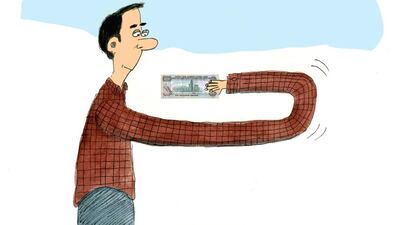So what exactly does "pay yourself first" mean?
These words emblazon various bridges that criss-cross motorways in the cities, and I have often wondered how many people realise what it's all about – or if they even realise that they don't understand what it's all about.
Come to think of it, I wonder if they even register the billboards in the first place. After all, it's no secret that half of advertising is effective – but which half?
When you've only got a 50 per cent chance of driving home a message, my thinking would be that you'd really want to nail it.
Instead we're fed stock phrases and bunches of words that don't resonate – not with us, the discerning client or consumer.
And so this is my attempt to make "pay yourself first" relevant, and a way of life for you.
You go to work every day of the week, you get a pay cheque at the end of every month. Do you ever stop to think what an hour of your time is worth? Do you know what you get paid for an hour of your expertise, knowledge and life?
Once you've worked that out, how about setting an hour's earnings aside to pay you. In fact, make that two hours a day.
How about thinking of it like this: at the start and finish of each day tell yourself that you're working these respective hours for you – for your future self. Not to pay the rent, go out or buy food. It's money for you – and I don't mean for you to blow on a treat or a toy.
This is money that you will invest or use to help you on your road to financial independence. Have a target. It could be your first foray into bonds, for example. Decide what you will do with "your" money, write it down, pin it on a board so you can see why you're doing this. You're removing money from your life today, so you can reap rewards tomorrow. This is called delayed gratification and we humans tend to have a great aversion to it.
If you do the maths, "giving" yourself two hours' worth of pay each day should work out to be a quarter of your earnings.
Now imagine if I was to say that you need to save 25 per cent of your earnings. You might simply switch off and not attempt to do it because it was "too much", because you "couldn't afford it" or other sorts of excuses. But when you break it down to two hours of your working day, my hope is that you realise that it's not a big ask.
Another way of thinking about it is to say that the money would probably be taken out of your pay packet automatically by your government if you were back home – so how about you being your own ministry of finance, social affairs and tax department all rolled into one?
A friend once told me why he wouldn't go back to work in the UK for the foreseeable future – the 50 per cent tax bracket he'd be in means he'd be working for the government for six months of the year. What an interesting way of putting it.
And so think of the first and last hours of the day as you working for you for a quarter of the year. That's really what saving the equivalent of two hours of wages a day means.
Once you've taken that money out of your earnings, it's best if you don't even see it hit your current account. Have it taken out automatically at source if possible.
If this is not an option, then sit down on payday and write yourself a cheque – that's the first payment you make, before bills, before socialising and buying stuff. Literally pay yourself first.
Your next challenge is making sure that you live within what's left and not a penny more.
So the takeaway from this is:
• Work for yourself first. Earnings from your first hour of work and last should go straight into a sealed vault. That gives you a fantastic 25 per cent savings rate.
• Live within what's left over.
• Challenge yourself to live on less. At the end of the month transfer anything left over in your current account to your savings account or investment vehicle.
In fact, turn this on its head and figure out how much you can "afford" to pay yourself each month, then give yourself a pay-rise of, say, 3 per cent every quarter.
Again make sure you only live on what's left. You'll be amazed at what you can cut back on and you'll find out what you need to live on.
Stick a photo of what it is you're saving for on your fridge or bathroom mirror – a visual incentive for being an even more effective minister of finance of your own fiefdom.
And so the next time you see the words "pay yourself first" - you'll really be drinking them in, and nodding knowingly, and I hope, happily, secure in the knowledge that you're doing that very thing and are well on the road to financial freedom.
Nima Abu Wardeh is the founder of the personal finance website www.cashy.me. You can contact her at nima@cashy.me

The true meaning of ‘paying yourself first’
Pay yourself first with 25 per cent of your income. That way you can reap the rewards of your earnings at a later date.
Most popular today
